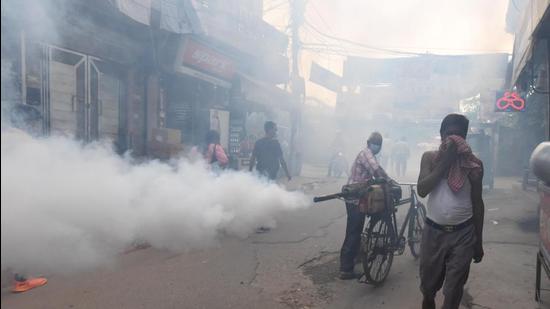With record rain in September, Delhi reports rise in dengue cases
The Capital registered 273 cases of the vector-borne disease till September 25. In comparison, the city recorded 212 cases of the infection in the same period last year
With record rainfall in September this year, Delhi is reporting an increase in the number of dengue cases, as it added 62 infections in a week, showed data from the city’s civic bodies. The Capital registered 273 cases of the vector-borne disease till September 25.

In comparison, the city recorded 212 cases of the infection in the same period last year. To be sure, doctors say fewer dengue patients reported to hospitals last year due to a fear of Covid-19. In 2019, Delhi logged 282 dengue cases in the same period.
Municipal officials warned that the breeding is on the rise.
“This is the peak time for breeding. Additionally, the city also received record rainfall at unexpected time, which will lead to more breeding. It does, however, seem less than 2010, when there was a lot of rain and Delhi saw one of the worst dengue outbreaks,” said a senior official from the South Delhi Municipal Corporation.
An official from the East corporation said, “Nowadays, we see cases being reported well into November. Earlier, the number of cases used to go down mid-October, as temperatures started dropping, but now we see that the mosquitoes start breeding indoors, especially in rooms where people switch on heaters during the winters.”
Even though the treatment for dengue is symptomatic, people must seek a doctor’s opinion said Dr Ashutosh Biswas, professor of medicine at the All India Institute of Medical Sciences (AIIMS) during a public lecture. “Some people who get dengue may develop severe disease. If they receive timely care and support they will be okay. Not everyone needs platelet transfusion. We have done a study, which shows that even with as little 10,000-20,000 platelets, people can recover on their own without any transfusion.”
He said, almost 70 to 80% of the deaths due to dengue happens in people with comorbid conditions such as high blood pressure and diabetes.
“The children and the old, the people with comorbid conditions like BP and diabetes, those with chronic infections like TB, those with supressed immunity, the pregnant, and those with a history of dengue are at risk of developing severe disease,” said Dr Biswas.
Unlike many disease where a previous infection confers immunity, in dengue a previous infection might increase the risk of severe disease. This is because there are four serotypes – the same virus with different make – that can cause the infection and the antibody against one serotype can increase risk of severe disease by another.
Stay updated with all top Cities including, Bengaluru, Delhi, Mumbai and more across India. Stay informed on the latest happenings in World News along with Delhi Election 2025 and Delhi Election Result 2025 Live, New Delhi Election Result Live, Kalkaji Election Result Live at Hindustan Times.
Stay updated with all top Cities including, Bengaluru, Delhi, Mumbai and more across India. Stay informed on the latest happenings in World News along with Delhi Election 2025 and Delhi Election Result 2025 Live, New Delhi Election Result Live, Kalkaji Election Result Live at Hindustan Times.





